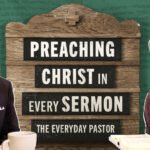Pastoral ministry.
Perhaps you’re in seminary and that phrase evokes visions of killer sermons, standing-room-only services, and, if you’re really lucky, conference speaking stardom! Or maybe you’re actually in the trenches, toiling week in and week out among some mighty tough wolves sheep. You feel joyless, exhausted—-like a shell of the man you once were. Or perhaps your experience is something else altogether.
Whatever your situation, Paul Tripp wants to have a word with you. His new book Dangerous Calling: Confronting the Unique Challenges of Pastoral Ministry (Crossway) begins by saying, “I am a pastor who is so bold as to assume that you, like me, need pastoring and, at least in the pages of this book, I will attempt to pastor you.” And so, gospel scalpel in hand, Tripp proceeds to perform open heart surgery on us—-227 pages of it. That may not sound like fun, but if you care about the state of your soul, the health of your church, and the reputation of the One who called you into this joyous mess in the first place, a gift awaits you.
I corresponded with Tripp about the dangers involved in reading this book, overworked pastors, the lethal disconnect, and more.
Of all the books you’ve written, what made this one the hardest to write? 
No book that I’ve written has so successfully exposed the sin, weaknesses, and failures of my own heart. It’s not an exaggeration to say that I wrote this book tearfully. The writing was marked over and over again by moments of personal prayer and repentance. I finished the book as a sad celebrant—-sad because of the renewed realization of the spiritual war still raging in my heart, yet at the same time celebrating the transforming grace daily lavished on me. Writing this book has renewed my commitment to constantly preach the gospel to myself until the preaching is needed no more.
What makes Dangerous Calling a dangerous read?
This book is meant to be biblically subversive. It’s designed to subvert our comfort with the present state of pastoral culture. It posits a gospel critique of the way we train, call, live with, and restore our pastors and ministry leaders. It’s also designed to subvert the subtle self-righteousness that so often attends and shapes ministry in the local church. I’d humbly suggest that if you read this book with an open, humble heart, you will not leave it the same. Unlike other books aimed at the struggle of pastors, this one doesn’t examine the typical topics of burnout, tension between family and ministry, and pastoral adultery. Rather, it looks at the deeper dangers of heart and life that lie beneath the topics that tend to get more ink.
“My prayer,” you write, “is that this book would get a conversation started that will never stop.” What’s the nature of the conversation you have in mind?
As I’ve traveled around the world engaging pastors in conversation every week, I’ve encountered again and again a fearful wall of silence that surrounds the life, ministry, and struggles of pastors. Many, many pastors live in silence, alienated from the community of care that the church has been designed by God to be. More than once I’ve heard pastors say, “Everybody else in the body of Christ can confess sin, but if I did, I think I would be done.” Think about it: every pastor is a sinner. Yes, the power of sin has been broken, but the presence of sin remains. This means the culture of silence that so often surrounds the life and ministry of a pastor is a culture that is unbiblical and, frankly, unworkable. All of this is compounded by the fact that churches often call pastors whom they don’t know because they tend to focus on knowledge, theological agreement, ministry experience, and pastoral skill. It’s not irrational to focus on these things, but it simply isn’t enough since a person’s ministry is never shaped by knowledge and skill alone—-it’s also always shaped by the condition of his heart. My hope is that Dangerous Calling would be used by God to break the silence and encourage a ministry culture of humility and candor that begins in seminary. Shouldn’t the gospel community be the most courageously honest community on earth? We believe that there’s nothing that could ever be exposed in us that hasn’t already been covered by the blood of Jesus.
What would you say to the pastor who just feels too busy to let others step over the boundary from public persona to private life?
There’s no indication in the New Testament that a pastor doesn’t need the same sanctifying ministry of the body of Christ that every other believer needs. If Christ is the head of his body, then everything else is just body—-including the pastor. Yet, in many churches no one receives less of the ministry of the body of Christ than the one charged with leading that body locally: the pastor. It is both unbiblical and dangerous for any pastor to live above or outside of the body of Christ. No pastor, then, should allow himself to live so isolated or to be so busy that he has no real connection to the intentionally intrusive, Christ-centered, grace-driven, redemptive community that God has designed the church to be.
What practical steps can one take to become a greater joy and blessing to his or her pastor?
First, remember to pray faithfully for your pastor. Know he not only has to bear the burden of dealing with his own heart issues, but he also bears the heavy weight of responsibility for the spiritual welfare of the local expression of the body of Christ that he’s been called and gifted to lead. Remember, too, that there are unique temptations he faces because of what God has called him to do. Second, do what you can to ensure that the pastor and his family have the time and wherewithal to do the kinds of things that keep a ministry family healthy. Third, go out of your way to express gratitude for your pastor’s contribution to your growth in grace. Fourth, if you are a leader, bless you pastor with the spiritual care and intervention that he needs by working to make your leadership community the most vibrant, humble, honest, encouraging, and restorative small group in the church. Don’t ever forget that no pastor is a grace graduate. Every pastor is a man in the midst of his own sanctification.
Involved in Women’s Ministry? Add This to Your Discipleship Tool Kit.
 We need one another. Yet we don’t always know how to develop deep relationships to help us grow in the Christian life. Younger believers benefit from the guidance and wisdom of more mature saints as their faith deepens. But too often, potential mentors lack clarity and training on how to engage in discipling those they can influence.
We need one another. Yet we don’t always know how to develop deep relationships to help us grow in the Christian life. Younger believers benefit from the guidance and wisdom of more mature saints as their faith deepens. But too often, potential mentors lack clarity and training on how to engage in discipling those they can influence.
Whether you’re longing to find a spiritual mentor or hoping to serve as a guide for someone else, we have a FREE resource to encourage and equip you. In Growing Together: Taking Mentoring Beyond Small Talk and Prayer Requests, Melissa Kruger, TGC’s vice president of discipleship programming, offers encouraging lessons to guide conversations that promote spiritual growth in both the mentee and mentor.

































